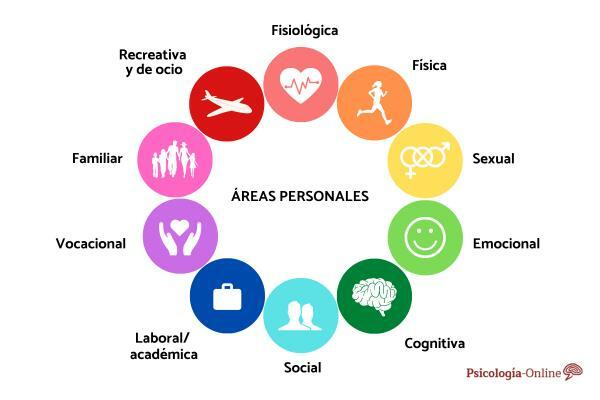
How to live a balanced life? What are the fundamental areas in life? The life of the human being is composed of several elements that are co-related. Each with its load of complexity and influencing each other, but all equally important. This Psychology-Online article invites you to learn more about the dimensions of the human being, we will see what personal development is and the 10 personal areas of life and how to develop them.
Index
- Physiological area
- Physical area
- Cognitive area
- Emotional area
- Sexual and reproductive area
- Social area
- Academic and / or professional area
- Vocational area
- Family area
- Recreational area
Physiological area.
The human body has unparalleled complexity. The physiological area mainly comprises our body, its organs and functions, which must be in optimal quality that allows the development of the rest of the areas of life with the greatest comfort and fluidity possible. The role of the human being in the development of his own physiological consists, basically, in caring for and improving his condition through the preservation of his organs,
Physical area.
Another area of a person's life is the external aspect, the physical, more inclined towards aesthetics and that is influenced mainly by social standards. This physical area has an equally important role to the others because it is mixed together with what is identity of the person, that is, it is directly related to the way you perceive yourself and what you reflect on your environment. To enhance this area, it is essential that you know your body, identify the parts you want to highlight and take into account maintaining a healthy lifestyle, thus avoiding harming your health. Keep in mind that physical appearance is not only about looking good, but about feel good.
Cogntive area.
The psychological area is made up of a compendium of elements that together lead to the complexity by which the human psyche is characterized. Aspects such as memory, attention, thought, language, emotions, rational logic, instincts, among others, are just some of the factors that occur in this dimension. You will understand then how important it is keep mental health fit and stable, so it is generally suggested to incorporate habits that contribute and help you exercise mentally into your daily routine.
Among these habits can not be missing brain gymnastics, leisure time and breathing exercises as main tools; in this way you will avoid that your memory is significantly affected as the years go by, that your attention span is easier to train and help curb negative or automatic thoughts that may appear in situations of stress. In the same way, we invite you to consult a mental health specialist if you consider that there is situations that you would like to learn to manage with professional and specific tools for your case. In this article we explain when to go to the psychologist.
Emotional area.
Another area of a person's life is emotional. The emotional area itself has a connection with the psyche, however, this is so complex that it is not limited to the recognition of each emotion but extends to what it is. emotional intelligence, how you feel about yourself and your self-concept, as well as how you express or inhibit each of them.
On the stability of the aforementioned, the emotional well-being of the human being depends, which is why it is suggested to apply emotion recognition techniques that allow you to verify if there is coherence between what you feel and what you think you feel to begin to build your well-being from self-knowledge.
In these articles you will find more information about how to develop emotional intelligence Y how to manage emotions.
Sexual and reproductive area.
The sexual dimension is equally vast despite the fact that, usually, people tend to associate it in a limiting way with genitality. In reality, sexuality as an area in the life of the human being has a lot to cut since it includes:
- Sex = genitalia.
- Secondary sexual characters = parts of the body characteristic of the male or female sex.
- Sexual act = intercourse.
- Gender = socio-cultural construction relative to what should be considered proper to man or woman / masculine or feminine.
- Gender role = tasks, activities and attitudes in general that society assigns to each gender, which in turn respond to the assigned sex.
- Gender identity = refers to the inclination that dictates with which of the genders a person identifies, regardless of her gender.
- Sexual orientation = is determined by the taste or attraction towards a person depending on the sex to which it belongs. Thus, this preference defines someone as homosexual, bisexual, heterosexual.
- Menstruation, menopause and andropause = hormonal processes of sexual origin.
In addition, there is reproduction, which biologically gave rise to sex to avoid extinction but which also involves other influencing factors to carry it out. The fact is that human sexuality is a dimension that requires attention from the person himself. for a healthy maintenance of it, with the intention of enjoying and maintaining stability in our life in general. Therefore, to develop your sexuality taking into account all the aforementioned processes, it is essential work on self-knowledge, self-exploration and the dismantling of taboos that allows you to express your sexuality freely.
Here you can see myths and realities of female sexuality.
Social area.
Another personal area to improve is that of interpersonal relationships. Social interaction is an elementary part of human development, from interaction with parents, through friendships, partners and even relationships with bosses and co-workers. Socializing properly denotes well-being and mental health in the person since this is a necessity, to create connections with our peers, especially those connections where the sentimental bond plays a leading role. It should be noted that interpersonal relationships are part of what makes up the social fabric and that personality characteristics such as the shyness or extroversion, influence them.
So, thinking about the best ways to develop this area, in addition to practice the assertive communication, a good technique would be use the Johari Window. This consists of locating four quadrants, simulating a window, where each of them will contain information about the perception that both you and others have of you.
Academic and / or professional area.
Another area of a person's life is academic or work. Work and studies, of any level, are present in a person's daily life, however, these can cause high levels of stress or anxiety depending on the degree of submission to the pressures that are have. For this reason, it is suggested to practice recreational and dispersal activities from time to time, as well work or school won't take up all your time and energy in addition to having the opportunity to deal with stress resorting to playful practices that stimulate your imagination.
In case you need guidance to guide this area, here you will find resources:
- Guide to know what to study.
- What to do when you don't like your job.
Vocational area.
Among the most important areas of life related to personal development, we find the vocational part. Certainly, professional or trade tasks deserve all possible dedication, it is desirable to work in an area that you are passionate about and that is your vocation, but this is not always the case. There are circumstances in which the vocation is directed towards an activity that is not necessarily in your work environment. Therefore, it is recommended to practice, at least superficially, various types of activities in order to know which of them you feel passionate about, since the exercise of an activity by vocation nourishes the meaning of life in individuals, not everything is about money. If you want to know more about the meaning of life, we recommend reading about the Japanese doctor Ikigai.
Family area.
The family group is both the nucleus from which someone arises as well as the family that is formed from that person (if one wants to form one). The latter is called "secondary family." Being a fundamental pillar, the family has the same relevance as the rest of the areas addressed; especially because it involves the interaction of factors such as communication, emotions, feelings, genetics, among others.
To develop and improve family life is key take into account that, despite being generally close emotional ties, each member of the family has a life of their own, it is prevalent tolerance and respect each other due to the diverse range of opinions and beliefs that will emerge over time.
Here you will find the different types of family that exist and also tips for a happy and united family.
Recreational area.
There is a marked tendency to underestimate recreation, which is a misconception. It has been found through studies that moments of "doing nothing" or being distracted represent a necessity for cognitive processes to be optimized. So leisure is one of the fundamental areas in life.
Today, with such a hectic lifestyle and precisely for that reason, we must set aside some time, if possible daily, to dedicate it to contemplate a landscape, take a nap or simply enjoy a coffee with a nice company.
This article is merely informative, in Psychology-Online we do not have the power to make a diagnosis or recommend a treatment. We invite you to go to a psychologist to treat your particular case.
If you want to read more articles similar to Personal areas of life and how to develop them, we recommend that you enter our category of Personality.
Bibliography
- Allport, G. (1986). The personality. Barcelona. Editorial Herder.
- Fritzen, S. (2002). Johari's window. Cantabria. Editorial Sal Terrae.
- Montaño Sinisterra, M., Palacios Cruz, J., Gantiva, C. (2009). Personality theories. A historical analysis of the concept and its measurement. Psychology. Discipline advances. Vol. 3. (2). 81-107.


